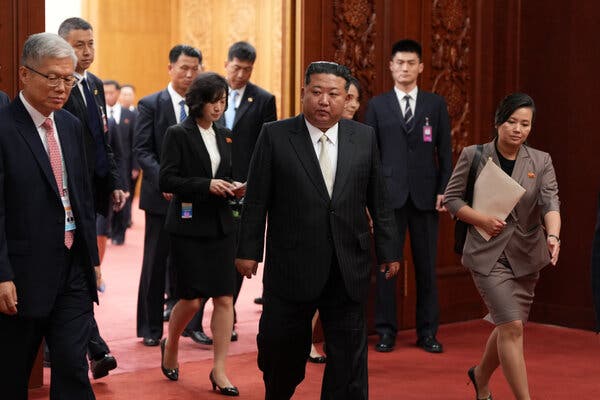Kim Jong-un’s Beijing Summit Marks Shift in Nuclear Diplomacy

During a significant diplomatic visit this week, Kim Jong-un, the leader of North Korea, concluded talks in Beijing with no reference to denuclearization, indicating a notable shift in nuclear diplomacy. This meeting with Xi Jinping, President of China, marks a departure from previous summits where the focus was primarily on reducing nuclear capabilities on the Korean Peninsula. Instead, the outcomes announced on Friday highlighted a growing acceptance of North Korea’s nuclear status.
Implications of the Summit
The absence of discussions on denuclearization reflects a strategic victory for Kim Jong-un, who has long sought international recognition of North Korea as a nuclear weapons state. Analysts suggest that while China may not officially endorse North Korea’s nuclear ambitions, the lack of insistence on denuclearization points to a significant shift in Beijing’s stance. Lee Byong-chul, an analyst at the Institute for Far Eastern Studies in Seoul, remarked, “It’s huge progress for Kim Jong-un’s strategy of getting his nuclear arsenal accepted as a fait accompli.”
This week’s visit underscores Kim’s increasing geopolitical value, particularly as he seeks to solidify alliances with both China and Russia. The recognition of North Korea as a de facto nuclear power has implications for regional stability and international relations, especially concerning security dynamics in East Asia.
Nuclear Tests and Regional Dynamics
Since 2006, North Korea has conducted six nuclear tests, leading to heightened tensions in the region. While past negotiations aimed at denuclearization have faltered, the recent summit suggests a recalibration of priorities. Analysts indicate that this new approach may embolden North Korea’s nuclear strategy and alter the dialogue surrounding nuclear weapons in the region.
Kim’s discussions in Beijing reflect a broader trend where China appears more willing to accommodate North Korea’s nuclear status, potentially altering the balance of power in Northeast Asia. The implications of this shift could extend beyond bilateral relations, affecting the stances of other nations in the region, including South Korea and the United States.
As Kim Jong-un departs Beijing, the focus will likely shift to how this new diplomatic landscape will influence future negotiations and regional security. The evolving dynamics raise questions about the effectiveness of traditional diplomatic strategies and the potential for renewed tensions as North Korea asserts its position on the global stage.






